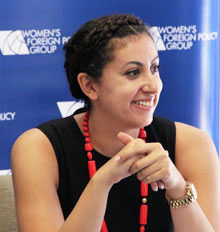Progress or Peril: The Role for Women in Defining Afghanistan’s Future
Michelle Barsa, Institute for Inclusive Security
Photos | Media

Washington, DC—On June 5, 2014, Michelle Barsa, senior manager for policy at the Institute for Inclusive Security, briefed WFPG members and guests on “Progress or Peril: The Role for Women in Defining Afghanistan’s Future”. Barsa spoke about the importance of women in the Afghan presidential election, the prospect of a political settlement with the Taliban, and the impact of the withdrawal of US and other international forces from the country starting in 2014. She also discussed how the stability of Afghanistan is inextricably linked with promoting women’s rights and women’s participation. The program was moderated by WFPG President Patricia Ellis.
Barsa hailed the recent presidential election as a “resounding success”, explaining that the unprecedented level of public engagement was indicative of the progress the country has made in the past decade. Afghans demonstrated a broad commitment to sustaining the political system, while women established themselves as a formidable voting base that the presidential candidates responded to. She explained that while Ashraf Ghani was supportive of women’s political participation, Abdullah Abdullah was a superior campaigner, and she expected that it would be “business as usual” if Abdullah were to come into power.
On the negotiations with the Taliban, Barsa emphasized that women have the most to lose if the Taliban or other conservative factions return to power. She expressed optimism that a political settlement could be secured but stressed that it would require meaningful engagement with a broad range of Afghan actors, including women and civil society. She also addressed the need for Afghan security forces to be operationally effective, arguing that the forces would need to be inclusive and have the capacity to address the security threats experienced by all Afghans, including women.
Barsa proposed three interventions critical to protecting Afghan women’s security, namely political participation, good governance, and access to legal recourse. The best way to protect women’s rights in the coming years is to “ensure that women are positioned to defend themselves”, and this can be accomplished by increasing political participation among Afghan women. Besides protecting the rights of women to vote and run for public office, Barsa maintained that women human rights defenders should be protected in their efforts to foster political participation. She emphasized the value of encouraging Afghan women to articulate their own women’s rights agenda, and saw civil society as a vital source of support for the women’s movement.
Barsa maintained that good governance includes not only the rule of law and equal application of laws, but involves ensuring equity of access in the provision of social services. Afghanistan is working to build the capacity of its institutions to provide education, health, and economic development services, she explained, and women can play an important role within these institutions.
Regarding access to legal recourse, Barsa stressed that women in the police force are capable of promoting democracy and providing security at the local level. However, ensuring law and order is contingent on women knowing they can and should report transgressions. She said this has been difficult, explaining that women are unable to access the police if they are an all-male force. She also emphasized the critical role that women can play in judicial bodies and in setting national security policy.